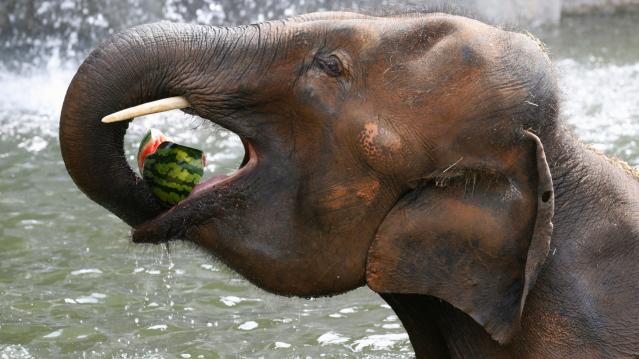Happy Watermelon Day! 16 Sweet, Juicy Facts You Didn’t Know

Frida Kahlo painted them and poets have celebrated them. In his “Ode to the Watermelon,” Pablo Neruda described it as “a fruit from the thirst-tree” and “the green whale of the summer.” He wrote: “its hemispheres open/showing a flag/green, white, red,/ that dissolves into/wild rivers, sugar, delight!” Abundant in summer, watermelons are by their very nature sweet and heavy, plus they’re full of vitamins: A, B6, and C. Aug. 3 is National Watermelon Day. We celebrate it here with 16 fun facts.
Related: Born in the USA: 24 Iconic American Foods
- Watermelons are 92 percent water.
- The word “watermelon” first appeared in English dictionaries in 1615, according to John Mariani’s The Dictionary of American Food and Drink.
- Watermelons are related to pumpkins, as well as cucumbers and squash.
- The world’s largest watermelon was grown by Lloyd Bright of Arkadelphia, Arkansas in 2005 and weighed 268.8 pounds, according to the Guinness Book of World Records.
- Watermelons originated in southern Africa.
- They appear in Egyptian hieroglyphics nearly 5,000 years ago. Watermelon seeds were found in the tomb of King Tut.
- Early explorers carried watermelons on long trips as a source of water, like canteens.
- Watermelons are both fruits and vegetables.
- China is the largest producer of watermelons in the world today, followed by Turkey and Iran.
- The U.S. currently ranks fifth in watermelon production worldwide. Georgia, Florida, Texas, California and Arizona are the states that grow the most watermelon.
- On April 17, 2007, the Oklahoma State Senate passed a bill declaring watermelon as the official state vegetable.
- Over 1,200 varieties of watermelon are grown in 100 countries across the world.
- Watermelons were introduced to the New World by European colonists and African slaves. Spanish settlers started growing watermelon in Florida in 1576.
- One cup of watermelon has more lycopene, a pigment with antioxidant effects, than a large fresh tomato.
- You can eat the seeds. And the rind. Here’s a recipe for pickled watermelon rind.
- Are your muscles feeling sore? Have some watermelon before your next workout. The juice contains L-citrulline, which the body converts to L-arginine, an amino acid that helps relax blood vessels and improves circulation.
Top Reads from The Fiscal Times:
- 16 Companies Taking Some ‘Junk’ Out of Their Food
- Here’s Why Americans Are Keeping Their Cars Longer than Ever
- Amazon’s Prime Concern—A New Online Blitz by Walmart
Deficit Hits $738.6 Billion in First 8 Months of Fiscal Year

The U.S. budget deficit grew to $738.6 billion in the first eight months of the current fiscal year – an increase of $206 billion, or 38.8%, over the deficit recorded during the same period a year earlier. Bloomberg’s Sarah McGregor notes that the big increase occurred despite a jump in tariff revenues, which have nearly doubled to $44.9 billion so far this fiscal year. But that increase, which contributed to an overall increase in revenues of 2.3%, was not enough to make up for the reduced revenues from the Republican tax cuts and a 9.3% increase in government spending.
Tweet of the Day: Revenues or Spending?

Rep. Kevin Brady (R-TX), ranking member of the House Ways and Means Committee and one of the authors of the 2017 Republican tax overhaul, told The Washington Post’s Heather Long Tuesday that the budget deficit is driven by excess spending, not a shortfall in revenues in the wake of the tax cuts. The Wall Street Journal’s Kate Davidson provided some inconvenient facts for Brady’s claim in a tweet, pointing out that government revenues as a share of GDP have fallen significantly since 2015, while spending has remained more or less constant.
Chart of the Day: The Decline in IRS Audits

Reviewing the recent annual report on tax statistics from the IRS, Robert Weinberger of the Tax Policy Center says it “tells a story of shrinking staff, fewer audits, and less customer service.” The agency had 22% fewer personnel in 2018 than it did in 2010, and its enforcement budget has fallen by nearly $1 billion, Weinberger writes. One obvious effect of the budget cuts has been a sharp reduction in the number of audits the agency has performed annually, which you can see in the chart below.
Number of the Day: $102 Million

President Trump’s golf playing has cost taxpayers $102 million in extra travel and security expenses, according to an analysis by the left-leaning HuffPost news site.
“The $102 million total to date spent on Trump’s presidential golfing represents 255 times the annual presidential salary he volunteered not to take. It is more than three times the cost of special counsel Robert Mueller’s investigation that Trump continually complains about. It would fund for six years the Special Olympics program that Trump’s proposed budget had originally cut to save money,” HuffPost’s S.V. Date writes.
Date says the White House did not respond to HuffPost’s requests for comment.
Americans See Tax-Paying as a Duty

The IRS may not be conducting audits like it used to, but according to the agency’s Data Book for 2018, most Americans still believe it’s not acceptable to cheat on your taxes. About 67% of respondents to an IRS opinion survey “completely agree” that it’s a civic duty to pay “a fair share of taxes,” and another 26% “mostly agree,” bringing the total in agreement to over 90%. Accounting Today says that attitude has been pretty consistent over the last decade.



